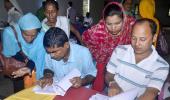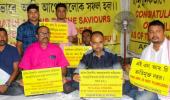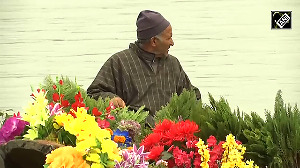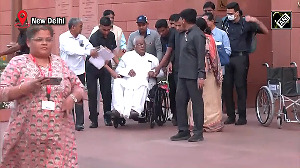The Citizenship (amendment) Bill has not been consigned to oblivion and will be brought again, home minister Amit Shah said on Monday, but sought to soothe the concerns of the northeastern states, insisting special laws specific to the region will not be touched.

Shah also asserted that the Centre intends to expel all illegal immigrants not just from Assam but the entire country.
Visiting the Assam capital, Guwahati, for the first time since the vexed final National Register of Citizens, which validates Indian citizenship of the residents of Assam, was published on August 31, the Bharatiya Janata Party chief also sought to quell apprehensions about scrapping of Article 371 of the Indian Constitution.
Article 371 applies to several states in the northeast and grants them special powers with regard to religious and social practices, and observance of law and order.
"We will ensure that existing laws of all states of the region remain as they are even after the introduction of the CAB. We have no intention to touch any of these laws applicable to different states of the region", Shah told a
meeting of BJP's allies who are part of the North-East Democratic Alliance.
He was addressing the fourth conclave of the NEDA, which is the northeastern version of the Centre's ruling National Democratic Alliance.
Shah was responding to concerns voiced by chief ministers Conrad Sangma of Meghalaya, Neiphu Rio of Nagaland and Mizoram's Zoramthanga.
Addressing the conclave, they had voiced fears about the consequences of reintroducing the CAB, as it could alter the demography of their respective states. They wanted that their states be kept out of the purview of the CAB.
The Citizenship (amendment) Bill was passed by the Lok Sabha on January 8 but could not be tabled in the Rajya Sabha following outrage in several parts of the country, particularly the northeast, where the BJP's allies led by Sangma were up in arms against it.
The bill provided for according Indian citizenship to Hindus, Jains, Christians, Sikhs, Buddhists and Parsis from Bangladesh, Pakistan and Afghanistan after seven years of residence in India instead of 12 years, which is the norm currently, even if they do not possess any document.
The home minister also asserted that even the cut-off date for CAB will remain December 31, 2014.
"It is very clear from our side that there will be no other date and Article 371 along with the Inner Line Permits (ILP) will not be touched," he added.
The Inner Line Permit is an official travel document issued by the Government of India to grant permission for inward travel to an Indian citizen into a protected area for a limited period. It is obligatory for Indians residing
outside those states where the ILP is in force to obtain prior permission to enter protected areas.
Shah also asserted that the Centre intends to expel all illegal immigrants not just from Assam but the entire country.
The BJP president also accused successive Congress governments of having alienated the region from the rest of the country.
"Our intention is to expel illegal immigrants from the entire country and not just Assam," he declared.
He alleged the prolonged militancy in the northeast was because the Congress hardly cared for the region.
"The Congress governments sowed the seeds of strife in the northeast. The party did not care for the northeast and because of that militancy flourished. It always believed in the policy of divide and rule," he alleged.
Shah also sought to re-emphasise the distinction between Article 370 of the Constitution pertaining to Jammu and Kashmir that the Centre revoked to strip the restive state of its special status, and Article 371.
"Article 371 is a permanent provision, while Article 370 was temporary," he said.
"I hope, with these assurances, all apprehensions of the chief ministers of the northeast regarding the CAB and the special provisions have been allayed," he said.
After addressing the conclave, the BJP chief held a meeting with the chief ministers of all the eight states of the northeast.
Speaking to journalists, Assam minister and NEDA convenor Himanta Biswa Sarma said Shah had addressed many concerns voiced by the chief ministers.
He said one of their foremost concerns was about the Inner Line Permit.
"Shah made it clear that the new CAB will ensure that its provisions do not override the 6th schedule of the Constitution," he said, adding that it effectively meant that unless a person got the ILP or the 6th Schedule Authority
allowed one to stay in a particular state, nobody from outside could go there.
Meghalaya chief minister Conrad Sangma called the meeting "very positive" where there was a convergence of view that both national and regional concerns be addressed.
"The home minister asked us to go ahead and have further consultation with local organisations and political parties so that any kind if misconception regarding the Bill can be cleared," Sangma said.
He said no deadline was set for the proposed reintroduction of the bill.
Arunachal Pradesh chief minister Pema Khandu said Shah made it clear that laws protecting indigenous people will not be touched.
"In fact, he said, that if needed, these local laws can even be made more strict," the BJP leader said.
Arunachal Pradesh is among the northeastern states where an outsider is required to obtain ILP for a visit.
The Citizenship (Amendment) Bill will be drafted keeping in mind these issues, Khandu said.











 © 2025
© 2025